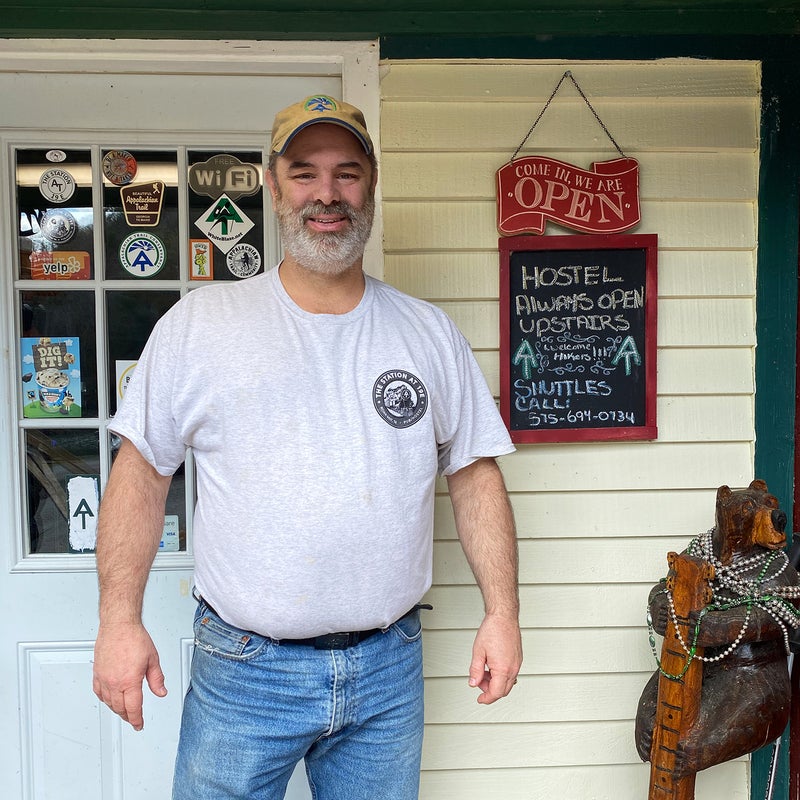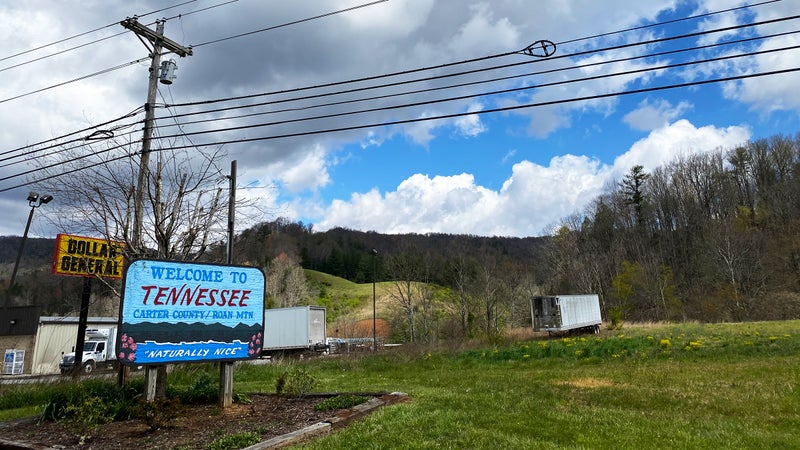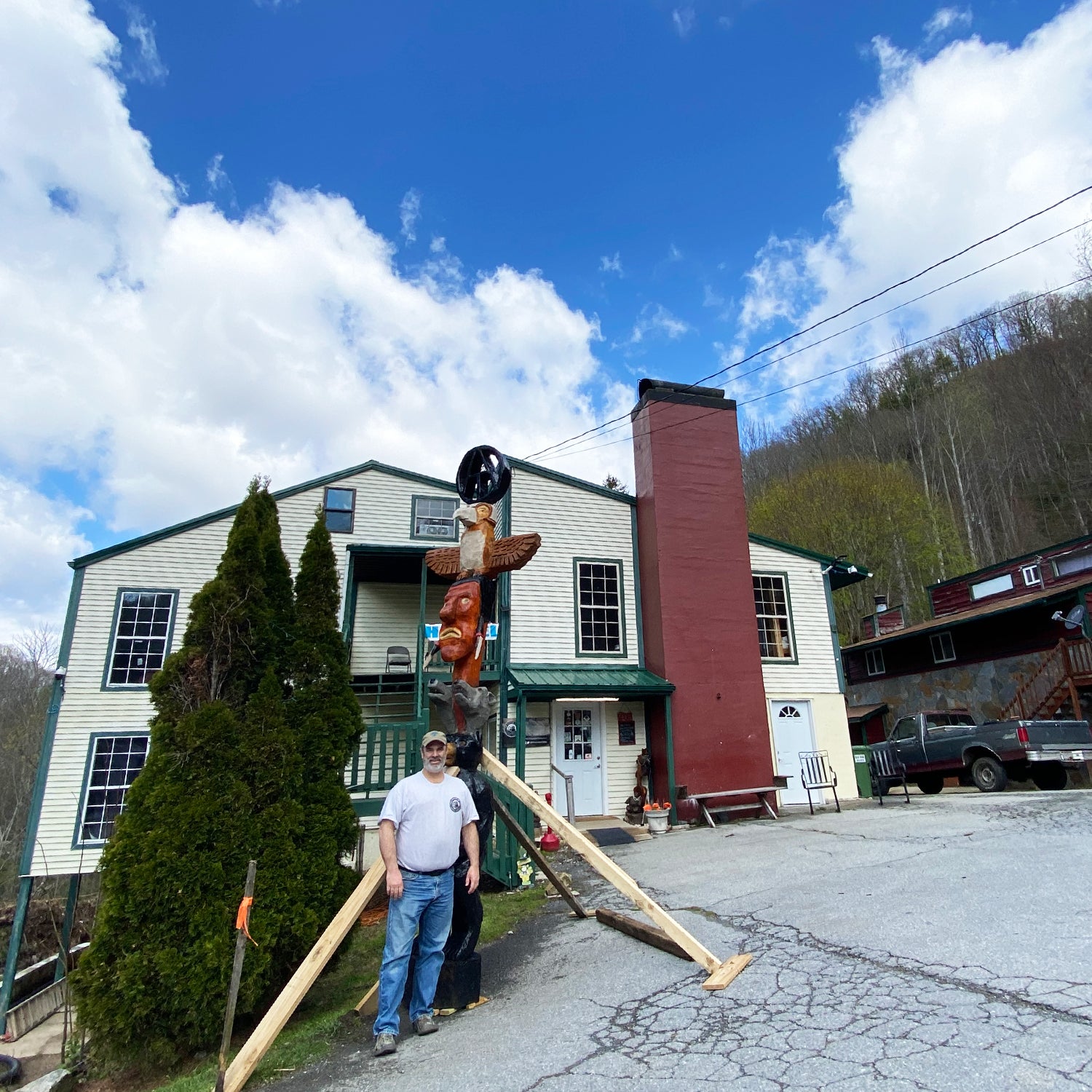David Magee is not so sure how much he should say about running a hostel along the Appalachian Trail this year, the year when the coronavirus pandemic has dashed all but a few thru-hiking dreams.
For three years, Magee—a 52-year-old entrepreneur who owned a traveling nurse company before settling in the Appalachian Mountains with his wife, Karen—has owned , a compound-like hostel along the Tennessee-North Carolina border. He begins, off the record, with a litany of grievances: how the Appalachian Trail Conservancy (ATC) caused a panic when it told hikers to go home without first consulting business owners like him. How people in the wider trail community lampooned him for staying open and putting his financial health over public health. How townspeople have called to threaten his business. After a few minutes, Magee decides he wants everything to be on the record; he reckons his renegade actions warrant documentation.
“I am doing what I have to do to protect my community—and the hikers who aren’t leaving,” he says. “I’m going to be on the right side of history with this thing.”
Four days later, Magee’s hesitation has hardened into the conviction of a crusader. The moment I step out of my car at The Station at 19E, he parades around the property, pointing out the ways he’s using this slump in business to refine his empire. �����ԹϺ���, a construction crew is cutting sliding doors into the walls of The Station’s dim music hall to boost eventual capacity. Magee beams at the towering totem pole—topped by the AT’s circular sigil—recently installed for advertising. And inside, an employee named Rocky bounds around with an infinite to-do list, offering me a fist bump until he registers the mask on my face. He laughs.
Magee hands Rocky a credit card and dispatches him to a hardware store a few miles away in Roan Mountain, Tennessee, the nearby village of 1,000 people with a for barbecue and burgers. In his light gray Station at 19E T-shirt, tucked across his slight paunch into faded blue jeans, and his Appalachian Trail Conservancy hat, Magee reminds me of a baseball coach, just waiting for his team to arrive. When they’re ready, he’ll be here. The Station, after all, has not closed at all to thru-hikers during the pandemic.
“I’m a firefighter. We run into the fire, not the other way. That’s not in my nature,” says Magee, who was once a volunteer with Roan Mountain’s unit. “If I’ve got droves of hikers walking into my town, that’s not OK with me [due to a threat of spreading the virus]. People will call and say, ‘Dave, there are two hikers walking into town. Come get ’em.’ I don’t want to let my community down.”

Magee is a member of a small but staunch confederation of hostel owners along the Southern half of the Appalachian Trail who have rebelled against conventional coronavirus wisdom. In addition to the ATC’s recommendation in mid-March, the U.S. Forest Service and National Park Service officially shuttered some sections. In Maine, Baxter State Park, the trail’s northern terminus, announced .
Many hostels from Georgia to Maine have responded in kind, closing for a season that never really began and, in some cases, saying the loss of revenue means they may never return. But a half-dozen hostels that dot the trail as it snakes across the boundaries of Tennessee, North Carolina, Virginia, and West Virginia have remained open, serving between 100 and 300 hikers who have defied those guidelines. They see it as their civic duty—not only to the hikers who remain on trail, but also to their small towns. They are the safeguard between the two populations, the stopgap.
At The Station, near the trail’s 400-mile mark, Magee scoops hikers at the trailhead half a mile away and has his staff run any errands they need, keeping them out of the town’s Dollar General and assorted restaurants, open for takeout when I visited in late April. More than 200 miles north, in Pearisburg, Virginia, Pippa Chapman has a similar routine for her hostel, . Clad in personal protective equipment, her employees pick up hikers at the trail, put their gear in plastic bags, and take them to shower and get into clean clothes before allowing them to visit the neighboring Food Lion in optional face masks the hostel provides.
“I could say I’m not dealing with hikers at all this year. But then I’d have to run into them at my grocery store anyway,” says Chapman, a chiropractor who has lived in Pearisburg for 25 years. “I have an obligation to deal directly with them. Otherwise, I would be letting my community down.”
Not everyone sees it that way. “This is America, of course, so everyone can make their own choices,” ATC president Sandi Marra says with a sigh. “But I worry long-term for their liability and their physical health. There are consequences for making those decisions. And in these small towns, people have long memories.”
Critics of hostel owners like Magee and Chapman often say they’re just trying to get rich at a time when other hostels have closed. But the owners balk at the suggestion, laughing in a way that implies “I wish.” By this time in the season, Magee has typically seen 800 hikers. This year, he’s hosted about 160, giving many of them cash to help them get off trail, he says. For hikers who intend to press ahead, Magee has kept his prices on food, fuel, and booze stable, refusing to gouge them with convenience fees. He calls the four months when thru-hikers parade through Roan Mountain “my Christmas,” the period that brings in most of his annual revenue. This year, he says he’ll be lucky to make a quarter of what he expected during the span.
In Virginia, Chapman closed her chiropractor business in early April after running out of personal protective equipment for herself and her patients. She’d hoped to use its income to float the flagging hostel, but that won’t happen now. “Hell, it’s something I work on every day, continually researching funding,” she says. “There’s zero money. We have bills to pay, whether or not hikers are coming. We’re losing money.”
All the work he’s done during this unexpectedly slow season will pay off as stay-at-home orders lift and people race for the woods. He expects to be busier than ever.
As Magee and Chapman discuss their decision, they flirt with an anti-authority sense of home rule, or the idea that each region of the country knows what’s best for itself. This dynamic has again become a national tinderbox during the COVID-19 pandemic, as it has many times throughout U.S. history. The tension between these hostels and trail leadership reflects deep divisions between local and federal guidance at large.
“We’re working with our local authorities to appropriately deal with the hikers. We want to be able to operate our businesses based on local regulations, and that’s what we’ve done,” says Chapman. In mid-April, she responded to an ATC email by saying she would subsequently distance herself from the national organization. “Every section has its own logistical issues, and we have systems in place to address them. They made a decision without consulting the communities that have to do that every year.”
At The Station, Magee doubles down on these provincial motives. He beams when he calls a group of 11 recent thru-hikers “The Resistance.” He lampoons the “bad predictions” of the Centers for Disease Control and Prevention, and he asks another of his employees, a former anti-nuclear activist named Crazy Wolf, to talk about the fundamental flaws with federal data.
The Station is situated along the Overmountain Victory National Historic Trail, a monument to revolutionary war renegades who before contributing to key Revolutionary War victories in the region. Magee embraces their fierce sort of backwoods independence. A New Hampshire native, he tells me about an ancestor, , who scalped her captors during King Philip’s War in the 17th century. I remind him of the time a year earlier when I was thru-hiking the Appalachian Trail and he was carting me through Roan Mountain. He spotted Sovereign, the man who was later charged with murdering a fellow hiker, after local authorities . Magee said he could handle the man himself, patting the Smith & Wesson he keeps on his hip.
“This is the Appalachian Mountains, and it’s a different world where people take care of their own,” says Magee a year later, Crazy Wolf nodding at his side. “If I wanted you put six feet under, it’s $100.”
That sort of autonomy, though, can quickly cross into selfishness, even if purportedly done in the name of protecting community.
Both Magee and Chapman cite their coordination with key local officials as they developed plans for staying open safely. Jason Stinnett, a senior environmental health specialist at the Virginia Department of Health stationed in Pearisburg, consulted with Chapman about complying with the state’s executive orders about campgrounds. But he says he did not know his advice was being used to facilitate hikers continuing north on the Appalachian Trail.

“I don’t think people here are expressly worried about a hiker coming from Tennessee and spreading coronavirus, but we understand it can happen,” says Stinnett. “But we have a stay-at-home order , and we expect people to adhere to that unless they’re going out for essentials. I don’t see how an Appalachian Trail hiker fits that definition.” (Virginia’s stay-at-home order does include a broad exemption for “outdoor activity,” but Stinnett says thru-hikers should stay home, and portions of the trail in Virginia have been closed.)
In Roan Mountain, Magee says he worked with Mike Hill, a veteran county commissioner who was instrumental in securing the town’s official designation as a “.” But Hill insists Magee has often appeared cavalier to public health concerns, especially since one of was a Roan Mountain resident. Hill chastised Magee for briefly running a coronavirus takeout special—a Reuben, chips, and a Corona beer for $8.99, advertised with the slogan “If you don’t want the Coronavirus, you can have a Coke”—and pled with him to close the business to locals if he was going to serve hikers.
“David very arrogantly said he was going to continue to operate. I told him all he needed was for one person to get sick, and he’s done. Are you willing to roll those dice?” says Hill, who notes that, as a fellow business owner and hiker enthusiast, he can understand Magee’s rationale for staying open. A Republican in a deeply red region where neighboring church signs read “God is greater than any virus—trust him and live” and “Church may be empty on Easter Sunday, but so is the grave,” Hill believes the threat of coronavirus is real, even if that means making difficult business decisions.
“I agree it’s our job as a trail community to help people as best we can. But one sneeze from a local takes out everybody on trail,” says Hill. “I want all my friends to be OK, so I can have a beer and hear live music at The Station one day. But I won’t be able to do that if they go out of business or they die. It’s tiptoeing through a minefield.”
Magee admits he’s made mistakes in responding to the pandemic and that his libertine attitude may have cost him goodwill. But he also seems convinced that the worst is almost over. The morning I was there, a mother and daughter interested in hiking a short section of the trail over a weekend asked if he could supply a shuttle and a private room. He reluctantly said no. The money sounded nice, but it was still too early to let in such outsiders who might infect thru-hikers, or vice versa.
That day is coming soon, though, he says. All the work he’s done during this unexpectedly slow season will pay off as stay-at-home orders lift and people race for the woods. He expects to be busier than ever. On my way back to my car, I ask if he ever worries that he is wrong, that this is the place where the coronavirus infects whoever is left on the Appalachian Trail in 2020. He sighs.
“Well, that’s my fear, that I’m on the wrong side of this thing,” he says. “But I have done what I think I can to help my town, so I’ll just have to see.”


